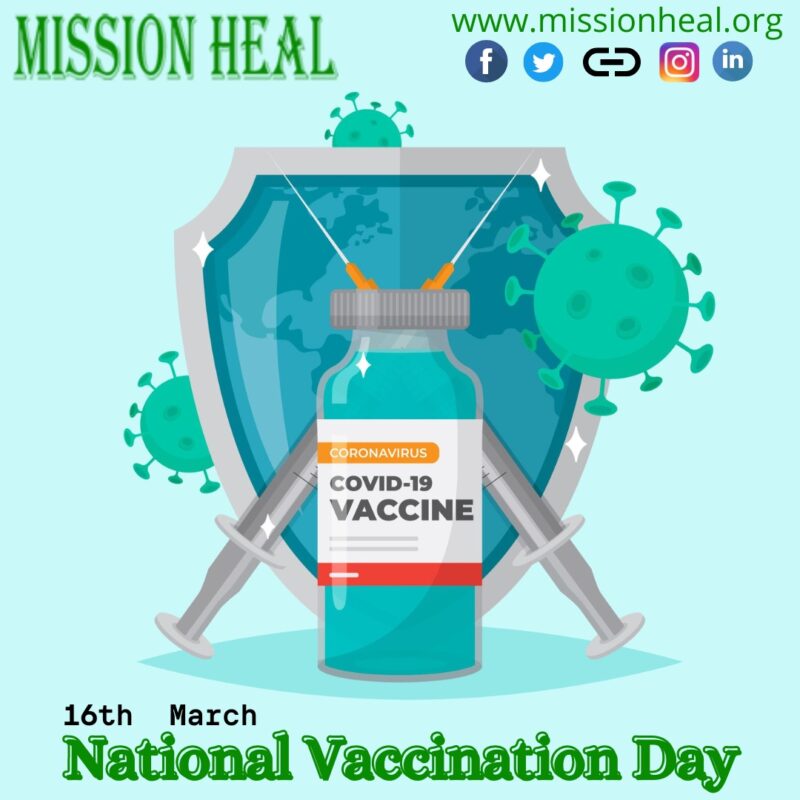A vaccination drive is not something new; we are all familiar with this term, but over the last few decades it has become an important tool. Following the rapid spread of diseases and the emergence of new diseases, the emergence and importance of vaccination increased.Mission Heal Real today will discuss all about National Vaccination Day and other factors related to it.
Vaccination is a way of safeguarding yourself against hazardous diseases before you come into touch with them in a quick, safe, and effective method with vaccinations. It strengthens your immune system and helps you develop resistance to particular infections by utilising your body’s inherent defences.
The immune system is trained to produce antibodies via vaccinations, just as it does when it is exposed to a disease. Vaccines do not, however, cause the disease or raise the risk of its complications because they only include weakened or destroyed versions of pathogens like bacteria or viruses.
Without vaccinations, we run the danger of contracting diseases like measles, meningitis, pneumonia, tetanus, corona virus, and polio, which can cause significant sickness and disability. Several of these illnesses have a risk of death.
Millions of people have been infected with the corona virus till date worldwide. In addition, it has claimed the lives of millions of people. Researchers from all around the world have been working nonstop to create vaccinations that will effectively combat the virus ever since the outbreak.
Now there are many vaccinations are available after so many researchers. The use of vaccines has the potential to save lives. The creation of the Corona virus vaccine was a crucial step in the fight against the pandemic.
Mission Heal Real sees vaccination is the best way to preserve from any disease. However, some vaccine may contain a little amount of aluminum salt that helps in increase immune power.
Mission Heal Real on History of National Vaccination Day
Every year on March 16, National Vaccination Day marked in remembrance of the day in 1995 when the first dose of the oral polio vaccine administers in India. The Pulse Polio Campaign, a remarkable effort to eradicate polio from India, honoured on National Immunization Day or National Vaccination Day.
Children between the ages of 0 and 5 received two drops of the Polio vaccination, per the programme. Since the World Health Organization declared India to be a “Polio Free Nation” in 2014, the Pulse Polio Program in that country has been a major success.
Further, now let us discuss about theme for national vaccination day.
National Vaccination Day Theme
2023: The theme for this year is not yet decided
2022: Vaccine Work for All
2021: Vaccine bring us closer
What is Immunization?
The World Health Organization calls immunization a “success story in terms of health and development.” It is the process by which a person’s immune system is strengthened against external threats.
The immunizations instruct the immune system to produce antibodies. The germs used in vaccinations are dead or weakened versions of viruses or bacteria that do not cause disease but instead produce antibodies that will protect the body from an active and powerful form of the disease.
What is the difference between Vaccination and Immunization?
Although they sound identical, vaccination and immunization have slightly different meanings. The term “vaccination” refers to receiving a vaccine, which includes receiving an injection or an oral dose. Getting the vaccine and developing immunity to the disease afterward known as immunization.
Schemes for National Vaccination Day
Keeping in mind the importance of vaccination/ immunization government has introduced some schemes for the benefit of people.
Mission Indradhanush
J.P. Nadda, the Union Health Minister, introduced the health mission on December 25, 2014. The programme seeks to maintain India’s 90 percent complete immunization rate by 2020. Eight vaccines-preventable diseases vaccinated against nationally: Diphtheria, Tetanus, Whooping Cough, Polio, Measles, a severe form of childhood TB, Hepatitis B, meningitis, and pneumonia brought on by Haemophilus influenza type B; and against Rotavirus Diarrhea and Japanese Encephalitis in specific states and districts, respectively.
The Indian government’s Mission Indradhanush intends to achieve the 2030 Sustainable Development Goal. The goal of putting an end to avoidable child deaths. The goal of Mission Indradhanush (MI), which starts in December 2014, is to get 90% of kids fully immunized.
Focus is on locations with low vaccination coverage and difficult-to-reach places. Where the percentage of unvaccinated and partially vaccinated children is highest during this drive.
Universal Immunization Programme
In 1978, the Ministry of Health and Family Welfare launched the Universal Immunization Program. It amended in 1989 to gradually encompass all districts in all states. The following vaccinations were given as part of UIP: Bacillus Calmette-Guerin, Oral Polio Vaccine, Hepatitis B, Tetanus, and Adult Diphtheria (Td), DPT, JE vaccine, PCV, Rotavirus vaccine, and Pentavalent vaccine. One of the biggest public health initiatives, the Universal Immunization Program. The targets over 2.67 billion babies and 2.9 billion expectant mothers each year.
The rate of under-5 mortality that can prevented by vaccination has decreased significantly. Let thanks to one of the cost-effective public health measures. If a child receives every required shot. According to the national vaccination schedule within the first year of life, they consider completely immunized.
The eradication of polio in 2014 and the elimination of maternal and neonatal tetanus in 2015 have been the two key achievements of Universal Immunization Programme.
Mission Heal Real on National Vaccination Day urges all people to vaccinate themselves to protect them from any diseases that can hazardous for them.
You can read such blogs and articles on the website https://missionheal.org/. Follow us on Facebook, Twitter, LinkedIn, and Instagram.

